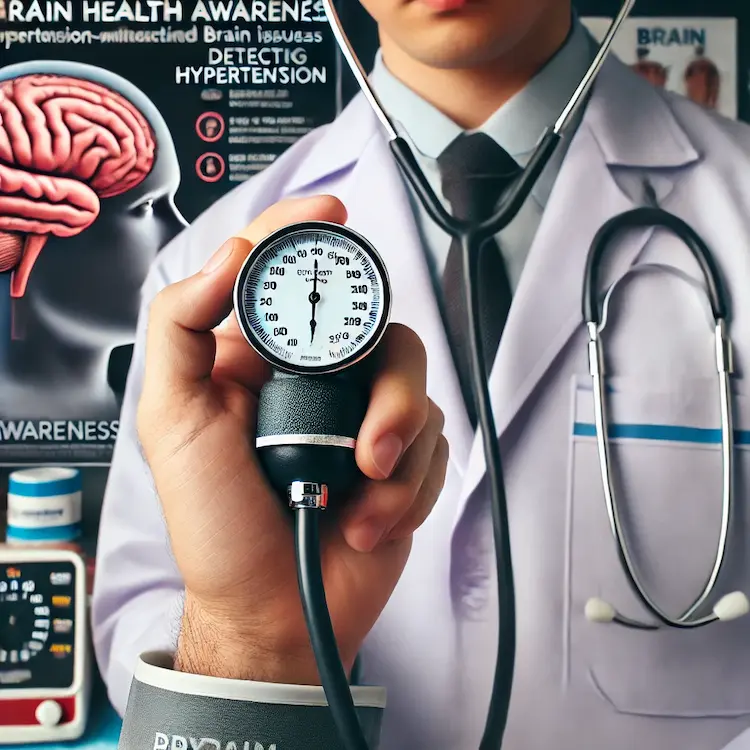High blood pressure (hypertension) is often called the “silent killer” because High Blood Pressure Affects on Brain, without obvious symptoms. Many people in the Philippines remain unaware of their hypertension until complications arise, leading to stroke, cognitive decline, or even dementia. The sphygmomanometer (commonly called a sphyg) plays a crucial role in early detection, helping individuals manage their health before irreversible damage occurs.
This article explores how hypertension affects the brain, the importance of early detection, and how different blood pressure monitoring tools contribute to better brain health in the Philippine context.
How High Blood Pressure Impacts Brain Health
Hypertension exerts pressure on blood vessels, causing damage over time. The brain, being highly dependent on a steady blood supply, is particularly vulnerable. Key impacts include:
Stroke and Mini-Strokes (TIAs)
- Uncontrolled high blood pressure weakens arteries, increasing the risk of stroke.
- In the Philippines, stroke is one of the leading causes of death, accounting for 63% of cerebrovascular diseases (Philippine Statistics Authority, 2023).
- Mini-strokes (transient ischemic attacks or TIAs) occur when blood flow to the brain is briefly interrupted, leading to temporary cognitive impairment.
Vascular Dementia
- Chronic hypertension damages small blood vessels in the brain, restricting oxygen and nutrients.
- Over time, this can lead to vascular dementia, the second most common type of dementia after Alzheimer’s.
- Studies indicate that Filipinos aged 60+ are at a higher risk of cognitive decline due to undiagnosed hypertension (DOH, 2023).
White Matter Lesions & Cognitive Decline
- High blood pressure accelerates white matter changes, impairing communication between brain regions.
- Individuals with hypertension have a 50% increased risk of developing cognitive impairment compared to those with normal blood pressure (Harvard Medical School, 2023).

The Role of the Sphyg in Early Detection
Regular blood pressure monitoring is essential for preventing hypertension-related brain damage. The sphygmomanometer (sphyg) remains the gold standard for accurate measurement.
Types of Sphygmomanometers Used in the Philippines
| Type |
Pros |
Cons |
Best For |
| Mercury Sphygmomanometer |
Highly accurate, used in hospitals |
Bulky, requires training, risk of mercury exposure |
Clinical settings |
| Aneroid Sphygmomanometer |
Portable, no mercury risk, affordable |
Needs regular calibration, human error possible |
Clinics, trained individuals |
| Oscillometric (Digital) Sphyg |
Easy to use, no training needed, stores readings |
Slightly less accurate than manual methods |
Home monitoring |
Among Filipino households, digital blood pressure monitors are gaining popularity, especially for elderly individuals managing hypertension at home. The Department of Health (DOH) has recommended their use for self-monitoring, reducing hospital visits.
Why Filipinos Should Prioritize Brain Health Monitoring
In the Philippines, hypertension-related brain diseases are a growing concern due to lifestyle factors such as:
- High sodium intake from processed foods (Filipinos consume twice the recommended daily limit of salt, WHO, 2023).
- Low awareness—many individuals are unaware they have high blood pressure.
- Limited healthcare access in rural areas, makes early detection difficult.
Practical Steps for Blood Pressure & Brain Health Management
- Regular Monitoring – Use a digital sphygmomanometer for home tracking, and visit a clinic for manual checks if unsure of readings.
- Dietary Changes – Reduce salt intake, and increase potassium-rich foods (e.g., bananas, sweet potatoes).
- Exercise & Weight Management – Studies show that losing 5-10% of body weight can lower blood pressure significantly.
- Medication & Compliance – If prescribed, take antihypertensive medications regularly. Non-compliance is a major issue among 40% of hypertensive Filipinos (DOH, 2023).
- Annual Brain Health Screening – For individuals over 50, cognitive screening helps detect early vascular dementia.

Conclusion
Hypertension silently affects brain function, increasing the risk of stroke, dementia, and cognitive decline. Early detection through regular sphygmomanometer monitoring—whether at home or in clinics—can prevent severe complications. Filipinos must prioritize routine blood pressure checks, maintain a healthy lifestyle, and seek medical guidance to safeguard their brain health.
Key Takeaways & Actionable Recommendations
- Unchecked hypertension is a major contributor to stroke and cognitive decline.
- Regular blood pressure monitoring with a sphyg can detect issues early.
- Lifestyle changes, medication, and medical check-ups help manage risks.
- Filipinos should adopt home monitoring habits to improve long-term health.

